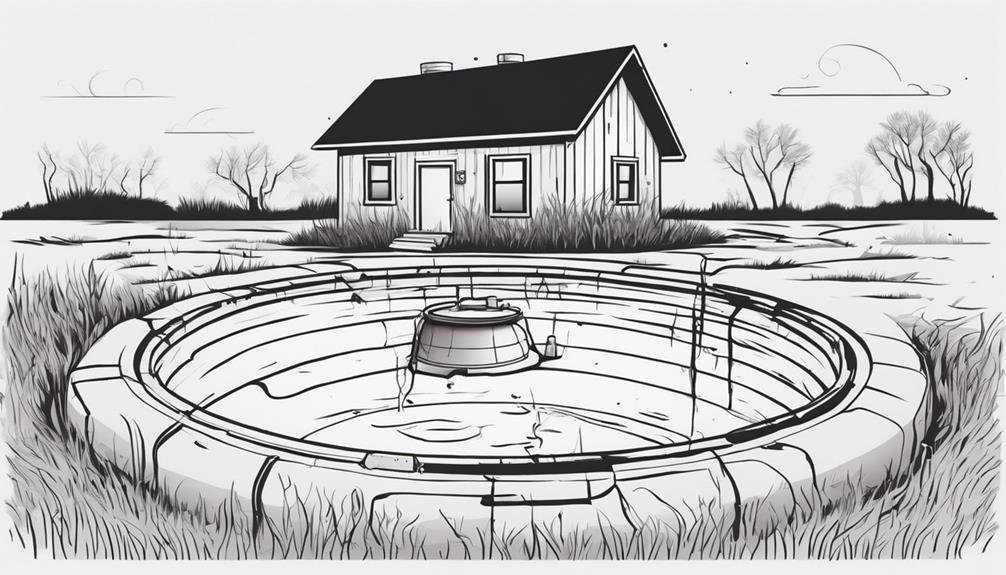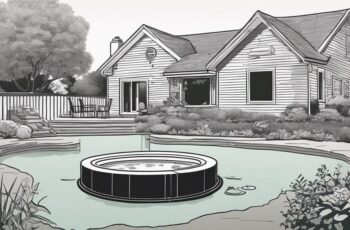When it comes to septic tank odors, it's like solving a puzzle – you need to identify the pieces to put them together for a complete picture.
Imagine a world where your outdoor environment is free from unpleasant smells, where you no longer have to deal with the nuisance of septic tank odors infiltrating your space.
Want to uncover the secrets to achieving this goal effortlessly? Stay tuned to discover the key strategies for eliminating septic tank odors once and for all.
Key Takeaways
- Proper ventilation and maintenance are crucial for controlling septic tank odors.
- Regular pumping and inspections prevent odor-causing buildup and backups.
- Natural remedies like baking soda, vinegar, and activated charcoal help neutralize odors.
- Enzymatic cleaners and septic-safe additives break down organic matter, reducing odors effectively.
Common Causes of Septic Tank Odors

To identify and address septic tank odors efficiently, you must first understand the common causes behind them. One prevalent cause is a lack of proper ventilation in your septic system. When your system isn't adequately ventilated, gases can build up and escape through the drains, causing unpleasant odors in and around your home. To combat this, consider installing vents in key locations to allow for the release of these gases in a controlled manner.
Preventative measures can also play a significant role in reducing septic tank odors. Regularly maintaining your septic system by scheduling routine inspections and pump-outs can help prevent the buildup of gases and solids that lead to foul smells. Additionally, being mindful of what you flush down your drains can also make a difference in odor control. Avoid dumping harsh chemicals or non-biodegradable items into your system, as these can disrupt the delicate balance of bacteria responsible for breaking down waste. By implementing proper ventilation and taking preventative measures, you can effectively combat septic tank odors and ensure a fresher environment in your home.
Impact of Neglected Maintenance
Neglecting maintenance of your septic system can result in a range of detrimental consequences, impacting both the system's functionality and the overall environment in your home. When maintenance is neglected, the buildup of sludge and scum in the tank increases, leading to a higher likelihood of clogs and backups. These blockages can cause wastewater to overflow, resulting in foul odors permeating your property. Additionally, neglected maintenance can lead to the development of anaerobic conditions in the tank, promoting the growth of odor-producing bacteria.
To prevent these issues, it's crucial to adhere to a regular maintenance schedule that includes pumping the septic tank every 3-5 years, depending on usage. Inspecting the tank and drain field annually can help catch potential problems early on, preventing costly repairs and minimizing odor production. By investing in proactive maintenance measures, you can ensure your septic system operates efficiently and odor-free, maintaining a healthy environment in your home.
Key Factors Influencing Odor Production

Failure to properly maintain your septic system can lead to the accumulation of sludge and scum, which are key factors influencing the production of foul odors in your property.
To understand how to address these issues effectively, consider the following:
- Inhibiting Bacteria Growth: When the balance of bacteria in your septic tank is disrupted, it can result in the buildup of organic matter that produces unpleasant odors. Inhibiting the growth of odor-causing bacteria is crucial to maintaining a healthy septic system.
- Proper Aeration: Insufficient oxygen levels in your septic tank can lead to anaerobic conditions that promote the production of hydrogen sulfide gas, known for its characteristic rotten egg smell. Ensuring proper aeration within the system can help mitigate this issue.
- Preventing Sludge and Scum Buildup: Regular pumping and maintenance are essential to prevent excessive accumulation of sludge and scum in your septic tank. These layers not only reduce the tank's capacity but also contribute significantly to odor production.
Solutions for Odor Control
Addressing septic tank odors requires implementing effective control measures to neutralize unpleasant smells and maintain a healthy system. When it comes to natural remedies, adding baking soda or vinegar can help reduce odors. Baking soda works by neutralizing acidic odors, while vinegar helps break down organic materials causing the smell. Another natural option is using activated charcoal, which absorbs odors effectively.
Additionally, regular maintenance like pumping the tank and inspecting for leaks can prevent odor buildup.
For those seeking quicker solutions, odor neutralizing products are available in the market. Look for enzymatic cleaners that break down organic matter causing odors. Septic-safe chemical additives can also be used to control odors. These products introduce beneficial bacteria into the tank, aiding in decomposition and odor reduction. Be cautious with chemical products and always ensure they're safe for septic systems to prevent damage.
Conclusion
In conclusion, managing septic tank odors is like taming a wild beast – it requires patience, diligence, and the right tools.
By addressing common causes, staying on top of maintenance, and implementing effective odor control solutions, you can keep those foul smells at bay and maintain a harmonious environment.
Remember, with the right approach, septic tank odors can be conquered and your home can remain a pleasant place to be. Keep up the good work!

